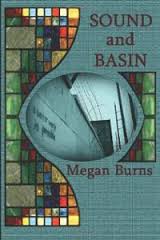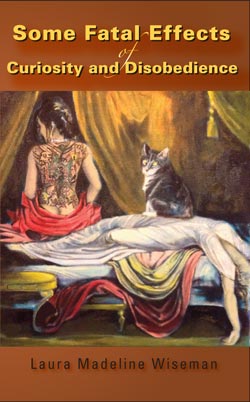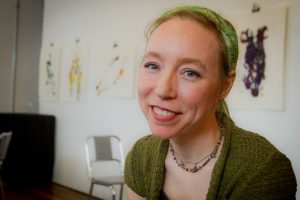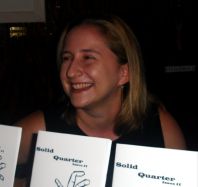Laura Madeline Wiseman: In her NPR interview with Terry Gross in October 2011, Marie Howe talks about mystery and the unsayable in poetry. In talking about one her poems, she says, “I think I was trying to tell a narrative or trying to tell a story or trying to explain something. I don’t know. I couldn’t, you know, every poem holds the unspeakable inside it, the unsayable, you know, not unspeakable as in taboo but the unsayable, the thing that you can’t really say because it’s too complicated, it’s too complex for us.” Can you talk about mystery and the unsayble in your new book the Sound and Basin?
Megan Burns: Laura, I like this idea of the “unsayable” rather than language being unable to hold what we need it to; it transfers the onus onto our ability to give space to what the poem can do. And sometimes, we as the poet, need to invest a bit of trust into the poem’s ability to be a placeholder for these events that seem to evade a simple telling. My first book, Memorial + Sight Lines, dealt with post-Katrina New Orleans, and I struggled a lot with being able to find the right “words” to capture that experience. So much new language emerges from these traumatic events, and in Sound and Basin, this struggle continues as I try to bear witness to the ongoing destruction caused by the Deepwater Horizon disaster. My third child was born months before the explosion and I watched the Gulf being flooded with oil as I would breastfeed her, so the experience of this destruction of life and the preciousness of life is deeply intertwined in this collection. It’s strange to qualify disaster, but the Deepwater Horizon event felt to me so much more perilous than Katrina, because if we destroy our waters with such careless negligence than there really is not much hope for a future planet for in which my children can live.
LMW: Yes, the Sound and Basin is a portrait, a song, an anniversary of New Orleans, a city that has become synonymous with the idea of disaster as well as the idea of watching, waiting for, participating in the what happens after disaster. How does such a city enable visions of urban landscape that resonate with a common American experience of place?
MB: As a New Orleanian, it’s hard to create that distance of how we survived Katrina as a city when you are personally trying to recreate an entire life that has been wiped away. I think a lot about place and memory because of this, every childhood memory I have exists in a place that no longer exists. The city continues to move further and further away from the place it might have been, and I think in the same way that we experience death, there is always this grief for the “other.” I can’t quite tell if living through this has made me a better or worse person, but I know it’s shattered this childish notion that the world we live in shall hold and in doing so hold us. Or maybe I have that backwards, maybe what I learned most from all of this is that language helps us hold the world and in doing so holds us. Friend and poet Vincent Cellucci has taught me, sometimes survival is all you have, and sometimes it is enough to keep you going.
From “Self-Portrait” there is a line that reads: “Some marriages are accidents, some arranged/ and some, like the slip of the knife, choose us.” Can you speak about the frames of desire & violence in this collection & how personally you came to understand their interconnectedness in this writing?
 LMW: I don’t remember when I first read bluebeard, the subject of Some Fatal Effects of Curiosity and Disobedience. It may have been when my mother read to us as children from a blue hardback edition of Grimm with gilt edging. It may have been when I was working on my M.A. in women’s studies. I read Margaret Atwood’s Bluebeard’s Egg then. I do know that the idea of a basement room with murdered women haunted me, held and compelled me to write about what those wives had to say.
LMW: I don’t remember when I first read bluebeard, the subject of Some Fatal Effects of Curiosity and Disobedience. It may have been when my mother read to us as children from a blue hardback edition of Grimm with gilt edging. It may have been when I was working on my M.A. in women’s studies. I read Margaret Atwood’s Bluebeard’s Egg then. I do know that the idea of a basement room with murdered women haunted me, held and compelled me to write about what those wives had to say.
I want to respond to the New Orleans you know, a place that was coupled with violence and desire for me as a teen. My best friend took me to see Interview with the Vampire, the film adaptation of the book and series I later read. Similar to the Twilight fans of now, I was enamored by the vampire world Anne Rice created. For years as a girl growing up in the Midwest that was the only New Orleans I knew. When I lived in Arizona Katrina hit and another world of New Orleans and the Gulf Coast emerged, this time via radio coverage and literature—Amanda Autcher’s The Wishing Tomb, Dave Egger’s Zeitoun, Jesymn Ward’s Savage the Bones, Natasha Trethwey’s Bellocq’s Ophelia, as well as your books. Sound and Basin is a rich offering of New Orleans and I read it with a different kind of terror, but also a desire for a place that I have not yet been.
I started researching what would become the anthology Women Write Resistance: Poets Resist Gender Violence when I started PhD school, a project that was seven years in the making and during that time I started writing poems about the women murdered in Juarez, even as I continued to read widely in theory, literature, and pop culture. Violence and desire were keys to doors I had to unlock during my graduate work.
If fairy tales and myths are meant to be didactic, even if we no longer live in the time of their original construction, I wrote Fatal Effects because I was curious to know what it offered us today. I kept coming back to a line from Charles Dickens’ version: “But the fair twin loved him, and the dark twin hated him, so he chose the fair one.” I thought about hate and resentment and marriage and why we might stay with someone, sensing the threat of bodily harm towards us, even if that violence isn’t manifested until our murder. I also was working within the bluebeard frame and the ways in which each of the sisters may have been aware of plot—a meta-awareness of the larger story their small place fit into—much as any of us may reflect on our place in plot (e.g. marriage, American Dream, keeping up with Jones’, etc.) even as we may (or may not) think of them as story lines, narratives, fiction. The sister in “Self-Portrait” chose to desire a violent man. Or perhaps he chose her. Or perhaps, she was framed and so thus framed, was made to be what she became.
MB: In “Against Plot” you write: “Sometimes the space between our bodies is a fiction.” Could you elaborate on how that relates to the spaces inhabited by myths & the space of the poem & how these two bodies of writing collide & intersect?
LMW: “Against Plot” focuses on intimacy and the ways in which sometimes we can feel utterly connected to another and sometimes we can feel, despite how we love or are loved, alone. I’m drawn to myth and the stories we tell about ourselves or the stories others tell about us. My chapbook First Wife retells the biblical account of Lilith. My book Queen of the Platform examines the story of a suffragist who spoke with Susan B. Anthony, people who became iconic and mythic in the women’s movement. My book American Galactic explores the sci-fi realm of Martians, crop circles, abductions and how humans might face an extra terrestrial invasion.
A poem, like literature and myth, like relationships, is a made thing. Poetry is from poesis meaning to make. Poets are makers. Bruce Bond told me that in his master poetry class I took at the Nebraska Summer Writing Conference early on in my graduate career. The act of writing then, is the act of making possible crossing between and among stories and myths. Sometimes that crossing is a retelling and an intersecting as it explores multiple versions of the same story. That is my hope with Fatal Effects. I wrote it having researched the bluebeard variations. Sometimes it can be a collision, a process that seeks to open up and present telling that were missing. I think of books like Ursula Le Guin’s Lavinia, Denise Duhamel’s Kinky, and Natasha Trethewey’s Native Guard, books that give voice to those (Barbie included) who had little or no space to speak. That, I think, is the work of language, of poetry, to hold the world for us, to make space, so that we might have the chance to speak.
***
 Laura Madeline Wiseman is the author of more than a dozen books and chapbooks and the editor of Women Write Resistance: Poets Resist Gender Violence (Hyacinth Girl Press, 2013). Her recent books are American Galactic (Martian Lit Books, 2014), Some Fatal Effects of Curiosity and Disobedience (Lavender Ink, 2014), Queen of the Platform (Anaphora Literary Press, 2013), Sprung (San Francisco Bay Press, 2012), and the collaborative book Intimates and Fools (Les Femmes Folles Books, 2014) with artist Sally Deskins. She holds a doctorate from the University of Nebraska and has received an Academy of American Poets Award, a Mari Sandoz/Prairie Schooner Award, and the Wurlitzer Foundation Fellowship. Her work has appeared in Prairie Schooner, Margie, Mid-American Review, and Feminist Studies. www.lauramadelinewiseman.com
Laura Madeline Wiseman is the author of more than a dozen books and chapbooks and the editor of Women Write Resistance: Poets Resist Gender Violence (Hyacinth Girl Press, 2013). Her recent books are American Galactic (Martian Lit Books, 2014), Some Fatal Effects of Curiosity and Disobedience (Lavender Ink, 2014), Queen of the Platform (Anaphora Literary Press, 2013), Sprung (San Francisco Bay Press, 2012), and the collaborative book Intimates and Fools (Les Femmes Folles Books, 2014) with artist Sally Deskins. She holds a doctorate from the University of Nebraska and has received an Academy of American Poets Award, a Mari Sandoz/Prairie Schooner Award, and the Wurlitzer Foundation Fellowship. Her work has appeared in Prairie Schooner, Margie, Mid-American Review, and Feminist Studies. www.lauramadelinewiseman.com
Megan Burns has a MFA from Naropa University and edits the poetry magazine, Solid Quarter (solidquarter.blogspot.com). She has been most recently published in Jacket Magazine, Callaloo, New Laurel Review, YAWP Journal, and the Big Bridge New Orleans Anthology. Her poetry and prose reviews have been published in Tarpaulin Sky, Gently Read Lit, Big Bridge, and Rain Taxi. Her book Memorial + Sight Lines was published in 2008 by Lavender Ink. She has two chapbooks, Frida Kahlo: I am the poem (2004) and Framing a Song (2010) from Trembling Pillow Press. She lives in New Orleans where she and her husband, poet Dave Brinks, run the weekly 17 Poets! reading series (www.17poets.com)
has been most recently published in Jacket Magazine, Callaloo, New Laurel Review, YAWP Journal, and the Big Bridge New Orleans Anthology. Her poetry and prose reviews have been published in Tarpaulin Sky, Gently Read Lit, Big Bridge, and Rain Taxi. Her book Memorial + Sight Lines was published in 2008 by Lavender Ink. She has two chapbooks, Frida Kahlo: I am the poem (2004) and Framing a Song (2010) from Trembling Pillow Press. She lives in New Orleans where she and her husband, poet Dave Brinks, run the weekly 17 Poets! reading series (www.17poets.com)
![[PANK]](https://pankmagazine.com/wp-content/themes/pank/assets/images/pank-logo-large.png)
